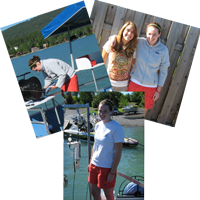One important aspect of our educational programming is encouraging and mentoring students to follow their curiosity and continue their studies in environmental sciences. The Ripple Effect Scholarship Program exists to accomplish this goal.
Past Interns
Summer Internship 2023
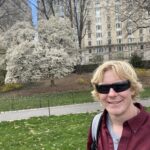
Niko Hunter, Columbia University, NY, NY
Entering my summer internship with Whitefish Lake Institute, I didn’t know exactly what to expect. Despite my high expectations and brief previous experience with the organization through FREEFLOW (the environmental club at Whitefish High School), I couldn’t have possibly anticipated the breadth of experience that I was about to gain. The summer kicked off focused on educational programming. I was immediately thrust into giving presentations about water quality to kids aged 2-14. While it took a short while for me to gain confidence, Durae and Mike were excellent mentors, and I found that learning through experience allowed me to retain information much more quickly than in a classroom setting.
I also spent many early summer days in the field collecting data on Whitefish Lake and its tributaries. Learning the data collection process was extremely rewarding, and the guidance of the WLI team helped me understand the workflow. Montana Fish Wildlife & Parks and the Flathead Lake Biological Station additionally played a large role in my internship, demonstrating the importance of organizational partnerships in the field of environmental science. I attended an aquatic invasive species prevention training at the Bio Station, and I was given the opportunity to spend a few days with FWP spawning fish and conducting field work.
The final portion of my internship has consisted of the Northwestern Montana Lakes Network, a research project that involves surveying 41 lakes in the Flathead Valley and beyond. This has been one of my favorite aspects of the summer, as it has served as a culmination of everything I’ve learned thus far while allowing me to explore and experience myriad beautiful lakes in the region. I could not be more grateful for the time I’ve spent with WLI. I have yet to hear of an internship opportunity that includes as wide a breadth of experience as the one I just received, and the amazing team only served to make everything even better. Upon my return to Columbia University this fall I am going to feel academically rejuvenated and experientially enriched, and I know I will carry this experience forward into the future of my educational and professional journey.
Summer Internship 2022
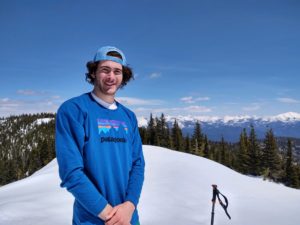
Sam Menicke, Macalester College, St. Paul, MN
My time at WLI this summer has been inclusive, engaging, and extremely fun. Even though I grew up hearing about the WLI’s work, it was hard not to be intimidated being the temporary fourth member of a very well established aquatic research organization in my area. However, from the moment I stepped into the office, Mike, Cynthia and Carol made me feel like a part of their three person family with their kindness and enthusiasm. My summer experiences felt more professional than anything I had done before, doing real data entry at the office and attending AIS and Septic Conferences at the Flathead Lake Biological Station. WLI’s passion for protecting Montana waters stems from their work ethic and vast knowledge of aquatic systems, but also from their community outreach and communication to individuals, like myself, who want to learn more about how we can preserve our water quality.
I was also impressed with WLI’s vast professional network. Throughout the summer, I was involved with multiple job shadowing opportunities with Montana Fish, Wildlife & Parks, USGS, the National Park Service, River Design Group, and the City of Whitefish. WLI works in tandem with all of these organizations, which cover the federal, state, and private sectors. I was especially grateful to have done these job shadows because it showed me what it would be like to work for all kinds of science organizations in the future. I also learned a TON about limnology, hydrology, geomorphology, wildlife ecology, and much more from all of these professionals. One of my favorite outings was going electrofishing with FWP where we conducted bull trout population estimates in the Upper Whitefish watershed.
WLI’s field work was also very fun to help with. I quickly got introduced to common field techniques to measure water quality in lakes and rivers, and jammed out to KOOL105 with Cynthia in the car. I went to some amazing lakes around the valley through the NMLN project, many of which I hadn’t been to before, and met some amazing people who shared our love for the natural world. I even did some tough trail maintenance in the wetlands, which was something Mike loved to see. Without fail, every day was a new, fun experience. This internship solidified my love for field work and got me excited about doing more science in the future. It also emphasized the importance of finding a great community to support you, like WLI has done in Whitefish. Rain or shine, I had a blast this summer and truly can’t thank everyone at WLI for such a rad summer! I know you guys will keep up the great work.
Summer Internship 2021
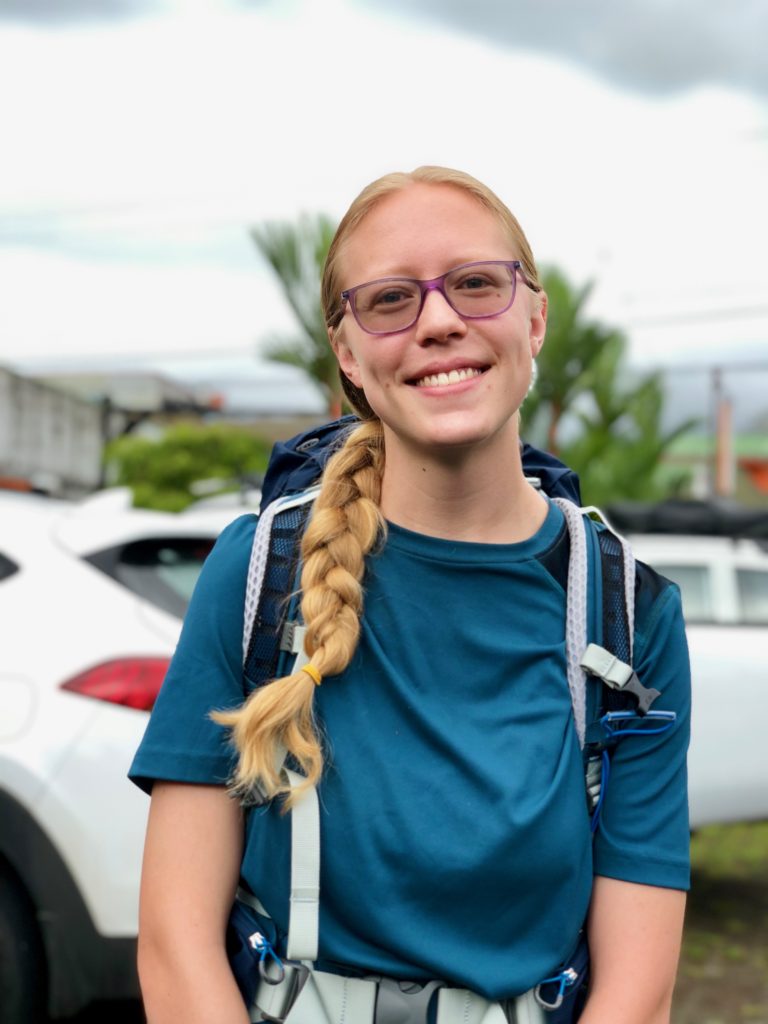
Molly Schmit, University of Montana, Missoula, MT
From day one, I felt right at home with Whitefish Lake Institute. Cynthia, Mike, Lori and Carol were always open to answering questions and helping me learn as much as possible. Their dedication to water quality monitoring, educating the public, and conducting research projects is truly inspiring.
Being an intern with WLI has exposed me to a wide variety of projects. I spent time both in the office and the field, which I found to be very valuable. While in the office, I worked on informational pages for the forty-one lakes in the Northwest Montana Lakes Network program, attended meetings, and helped with social media posts. Helping with an educational kids’ program about macroinvertebrates at the Whitefish Public Library definitely ranks as the most adorable day of my internship. Teaching the kids the “mayfly mamba” and “stonefly shuffle” was my personal favorite. Of course, the highlight of the summer was the field experience. I helped with baseline sampling from Whitefish Lake and the tributary streams that run into it. Mike and Cynthia always made sure I understood the ecological processes going on in these habitats.
Once the beginning of July rolled around, Cynthia and I began data collection for the Northwest Montana Lakes Network program. It was incredible to see so many lakes around the area that I had never even heard of before. From the high mountain waters of Big Therriault Lake, to the large expanse of Flathead Lake, I garnered a great appreciation for water resources in the Flathead Valley. It was also delightful to meet the volunteers that make this program possible. Seeing the genuine care and passion that citizens show for their lakes was encouraging, and made me confident in the future of water quality monitoring. This summer has not only been educational, but fun! Cynthia, Mike, Lori, and Carol were all wonderful to work with. I’m incredibly grateful for this experience, and I look forward to applying what I’ve learned to my future career.
I have also been amazed by the following and support shown by the people of Whitefish for WLI. The donations, partnerships and informal connections which allow WLI to be so well integrated into the community are, I believe, a product of its track record. It’s clear that the team at WLI does everything they can to preserve the health of Whitefish Lake and the other lakes which they monitor (and there are a lot!). They’re efficient, and that’s because they share a certain humility; there is an absence of any need for recognition and a willingness to work hard with the knowledge that it’s benefitting an important cause.
It’s really quite incredible how much a team so small as that of WLI accomplishes, and how diverse their engagements are. I feel fortunate to have experienced so much under the guidance of Mike, Cynthia and Lori, and I’m eager to use all that I’ve learned in the coming years. Thank you, Whitefish Lake Institute, for a formative and fun summer.
Summer Internship 2019
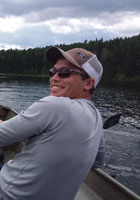
Graham Friedman, Harvard University, Cambridge, MA
Whitefish Lake Institute exemplifies commitment to an important cause, and I’m grateful to Mike, Cynthia and Lori for letting me join them this summer to learn about all that they do. I’ve gained a new appreciation for the challenges of managing and funding a nonprofit, conducting research on something as broad and understudied as the Flathead’s waters, and the risks which a changing climate and human development pose to these ecosystems. I’m sure I’ll find my experiences this summer to be invaluable professionally and academically.
A highlight of my time at WLI has been the diversity of work in which I’ve been able to participate. In addition to helping with WLI’s initiatives, I have worked with River Design Group; Montana Fish, Wildlife & Parks; USGS and city employees. From this, I’ve gained a well-rounded appreciation for the many ways that local organizations look after our natural resources. And in gaining this appreciation, I was struck by the wide-ranging, collaborative involvement of WLI: though I’d read about their work before this summer, it’s become clear that their involvement and influence spreads beyond Whitefish Lake and our town, and often benefits or is benefitted by other groups in the valley.
I have also been amazed by the following and support shown by the people of Whitefish for WLI. The donations, partnerships and informal connections which allow WLI to be so well integrated into the community are, I believe, a product of its track record. It’s clear that the team at WLI does everything they can to preserve the health of Whitefish Lake and the other lakes which they monitor (and there are a lot!). They’re efficient, and that’s because they share a certain humility; there is an absence of any need for recognition and a willingness to work hard with the knowledge that it’s benefitting an important cause.
It’s really quite incredible how much a team so small as that of WLI accomplishes, and how diverse their engagements are. I feel fortunate to have experienced so much under the guidance of Mike, Cynthia and Lori, and I’m eager to use all that I’ve learned in the coming years. Thank you, Whitefish Lake Institute, for a formative and fun summer!
Summer Internship 2018
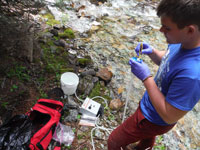
Zach Cook, Brown University, Providence, RI
To see the ability of a small group of people to change the world for the better, one doesn’t need to look any further than the Whitefish Lake Institute. This past summer, I have had the pleasure of getting to know and work alongside the amazing people that make up WLI. I cannot say enough about Mike, Lori, and Cynthia. Their passion, enthusiasm, knowledge, work ethic, and good heartedness is something to be envied and is the epitome of what it means to pursue a passion and be an impactful non-profit. I could not ask for anything more appropriate to model my life after and to strive for than the example that these three have set as scientists, educators, community members, volunteers, and so much more.
During my time as an intern at WLI, I have gained experience in aquatic ecology, limnological field data collection, aquatic invasive species management, watershed processes, broader bioregional theory, and have learned about the inner workings of a small nonprofit among countless other things. I have been able to traverse up into the mountains and bushwack to hidden streams to collect bull trout eDNA samples, and I have been able to be a part of establishing a social media presence to expand the organizations reach. I’ve sat through commission and conservation district meetings, and have nearly submerged myself in the lake as I wore my waders for the first time. My time at WLI has exposed me to the colossal amount of work that is put in to keeping the watershed healthy and to so many other different projects going on in the state of Montana and the Whitefish community, and has allowed me to see a side of science and nature that I’ve never seen before.
Most importantly, my time at the Whitefish Lake Institute has been a lesson in humility, perseverance, and having faith in your community to support you and to accomplish your shared goals of creating a better world in which to live. No amount of words, let alone a few paragraphs, can express how thankful I am to the Whitefish Lake Institute and the community which supports them for the amazing opportunity I had to be apart of this this summer. This internship experience has truly changed my life. Thank you!
Summer Internship 2017
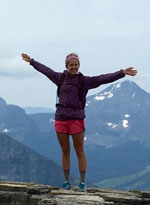
Barret Gray, Princeton University, Princeton, NJ
My summer experience at Whitefish Lake Institute has been a memorable one. Mike and Lori have not only taught me a great deal about the importance of protecting and caring for Whitefish Lake and surrounding water, but also about the roller coaster of running a nonprofit, which is something that can only be learned from experiences like this one.
My job duties were far and wide, which gave me experience in many different areas. In the field, I helped collect baseline samples from the Lake and surrounding tributaries, did maintenance at the Viking Creek Wetlands, and worked as a fill-in boat inspector. Inside the office, I helped with organization, performed data entry, researched facts on septic leachate, and am currently writing a research report on the effects of fireworks on water quality. Mike and Lori always made sure I was adequately caffeinated by keeping the fridge stocked with coffee and with frequent office trips to Coffee Traders.
The passion Mike and Lori have for the work that they do is remarkable, and something I aspire to have in whatever field I find myself working in. I have had the amazing experience of watching them create an AIS inspection and decontamination program for Whitefish that I believe is the best in the state. They were a joy to work with, and I am grateful to have been a part of this incredible organization.
Summer Internship 2014
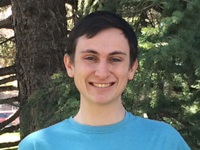
Dietrich Perchy, Montana State University, Bozeman, MT
Working with WLI for the past four months has opened my eyes and mind a great deal. I have learned the importance of practicing proper data collection techniques, seen how having dedicated teammates can make for a safe and efficient working environment, and lastly how having a strong leader can create a positive work environment.
I remember coming into my first day at WLI, I was worried that I would have to answer a lot of questions about lakes and tributaries, such as knowing the invertebrates and vertebrates of each lake. Coming into the office on that sunny Monday in May turned out to be one of the most fun and interesting days I have ever seen. We started the day with our Monday Morning Meeting; our creative Finance and Administrative Manager, Jen Croskrey, brought in some of her office wide known muffins. Lori Curtis, our wonderful Science and Education Director, began talks of the annual Wine Auction, which I did not realize was such a large event to plan. At the time I thought it was just a little party with some stuff to auction off, how hard could it be? Then Josh Gubits, our Environmental Scientist, described what kind of data collection I would be doing with him out in the field, locations we would visit and how I could prepare.
At this point I was beginning to wonder what I had gotten myself into and if I would be able to remember everything. Then Mike Koopal, the Executive Director, began his talk, and suddenly everything seemed to sound like it was going to work out. He planned out the next week, went over expectations for everyone and their duties for the week, and basically watered-down the list of items I had just heard into a simple little stream of tasks and jobs to accomplish. Throughout the rest of the day the staff showed a great deal of patience and kindness by showing me around the office and garage and teaching me more about WLI.
As the week progressed, I went out into the field to learn about proper data collection methods with Josh and Mike. We traversed all around the Flathead Valley collecting from and analyzing the beautiful bodies of water in the valley. Learning about the special characteristics of each area we sampled and tested was truly fascinating.
As the WLI Annual Wine Auction approached, I was in the office with Lori and Jen, who are some of the hardest and most dedicated workers I have ever had the pleasure to work with. I supported them while they planned one of the best wine auctions in WLI history. I felt truly honored and fortunate to have been part of such an amazing event.
Having the opportunity this summer to work with world class scientists will be a memory that I hold for the rest of my life. I would like to thank Mike, Lori, Josh, and Jen for taking me under their wings and teaching me the ropes at WLI. I learned so much and am so grateful for the adventures that we shared together.
Summer Internship 2013

Logan Seipel, University of Wisconsin, Stevens Point, WI
Looking back on my time spent at the Whitefish Lake Institute I struggle to come up with a single phrase or word to describe the summer. I can say however that my time here went by much faster than I could have imagined, and that the experience was something I will not forget. It honestly seems as though only a few days ago I was introduced to the great people that work at WLI, shown how to use equipment, and given a tour of the wetlands.
Within the first few weeks I had gained such a knowledge regarding not only limnology, but also what the Whitefish Lake Institute does on a daily basis, and how they are truly making a difference in the Whitefish area. My summer started with some sampling trips out on Whitefish Lake, tributaries to the lake, and many other lakes in the area.
Some days however were filled with activities that I did not expect. I found myself some days wanting to kick the copier, digging holes for interpretive signs, clearing trails for the grand opening in the wetlands and working with high school students in the FREEFLOW program. A midday coffee resupply for the office was not uncommon during the hectic workdays before the wine auction either! While unexpected, these experiences were all just another part of what WLI does beyond simply research and I learned a great deal from every single one of them. I also gained a much better understanding of the opportunities that exist in the workplace after I complete my time as a student.
I was fortunate enough to be a small part of the preparation and grand opening of the Living Wetlands Interpretive Nature Trail in the Viking Creek Wetland Preserve this summer. Just seeing the vast amount of work WLI has put into the preserve finally come to fruition was a moment I will not forget. This was just one of the many things that WLI has done that is truly making a difference.
One of the most important things however that really made this an unforgettable experience was the people. Every member of WLI brings a different aspect and personality to the table. This makes for one of the best work places I’ve ever been a part of. Mike’s patience and knowledge has guided me through a small project this summer, and he has shown me what it means to be an effective scientist. Working with Josh in the field I have seen how crucial it is to effectively collect data using proper field techniques. Finally, Lori’s incredible work ethic and never-ending positive attitude has brightened almost every one of my mornings at WLI. I cannot say enough about this organization and the people that bring it to life everyday. This was definitely a summer I will not forget!
Summer Internship 2012
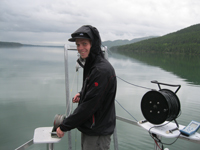
Carl Talsma, Cornell University, Ithaca, NY
When I think of my time spent at the Institute and the experience I’ve gained, it’s hard not to observe a sharp clash of contradiction between expectation and reality. Before I started working in May, I expected to be working for an environmental awareness group defending the interests of Whitefish Lake. WLI turned out to be so much more. What WLI lacks in means it makes up for in ambition and I soon discovered myself taking water samples on dozens of lakes in the Flathead whose existence must be unheard of to most. I not only learned about aquatic invertebrates and invasive species, but I found myself helping educate seniors on the very same subjects.
I also found three very determined and industrious people in Mike, Josh, and Lori who work tirelessly to help protect the Flathead and yet find time to crack a few jokes in between.
As I get closer to choosing a career it’s becoming more evident to me which careers and agencies actually benefit the society that supports them. At Whitefish Lake Institute, I found a pragmatic approach to environmentalism that truly has a profound impact on the community. Through diligent sampling and research paired with community outreach and education, the institute provides the community and policy makers with the tools and knowledge to make a decision to protect the resources that make Montana great. I know now that when I’m looking for jobs to look for a place like the institute where work and diligence culminate in a deep communal impact.
Summer Internship 2012
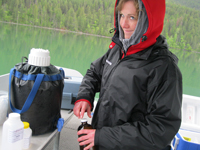
Meagan Powell, Westminster College, Salt Lake City, UT
Meagan also joined WLI as a part-time intern after completing her first year at Westminster College in Salt Lake City, Utah. She graduated from North Idaho College in 2011 with an Associates Degree in English. Meagan was attracted to Westminster initially for their English program. However, once at the college, she was drawn to their exceptional environmental studies program. She left her internship with plans to finish school with a Bachelors degree in Environmental Studies, then she will consider the possibility of several different research programs abroad.
Meagan has lived in the Flathead all her life, keeping busy with athletics, dance, and piano in high school, and continued to play soccer in college for both the North Idaho Cardinals as well as the Westminster Griffins. She also plays with the Mudpuppies, a local women’s hockey team, and is an avid skier. During the summer she spends her free time dancing, running races, kayaking, and playing on the water.
Summer Internship 2011
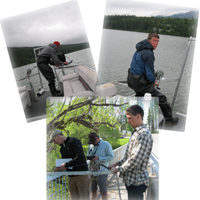
Leif Castren, Middlebury College, Middlebury, VT
As I contemplate my time spent at WLI during the past summer, trying to recall a moment that epitomized an internship spent with Josh, Lori, and Mike, I am bombarded by a flood of memories seemingly unassociated with water quality or watershed education. Even as I sit at a computer stall in my brightly lit and deafeningly quiet college library, I can hardly suppress my chuckles as I recall our daily banter in the office, our long field excursions, and many moments of oddity and hilarity in between. The memories I would like to remind myself and others of were of laughing:
With Lori as she stood in the back of the boat, distracting me with rapid-fire speech in some made-up accent, while simultaneously pumping chlorophyll samples, filling water chemistry bottles, and making labels for the next site, as I attempted to ease the boat into a shore site.
With Josh as he stared in shock at the recently punctured tire of the WLI truck, the malfunctioning Hydrolab, or the missing piece to our bridgeboard, his tongue tripping over his chewing gum as he cursed our misfortune, or as he performed his famed “Mayfly Mambo” for a crowd of seniors during our Friday educational programs.
With Mike as he enviously eyed my lunch during a snack break out on the water, or as he gave me all the fun jobs on field days, only to remind me jokingly of my nonexistent salary.
And with myself as I licked the seal of hundreds of envelopes of Wine Auction invitations on a rainy day and sang along to Lori’s Cat Stevens CDs, or as I spent a long day joyously pulling weeds in the company of last summer’s intern Michael Harrison in the mosquito infested swamp WLI cherishes as their Wetland Preserve.
I remember running out from under the thin aluminum roof of the pontoon boat and taking a sustained blast of heavy hail and rain to my exposed face and limbs with a whoop of joy as Josh and I skipped back across Whitefish Lake to City Beach as fast as the boat would safely take us.
Though many of my most notable memories focus on the comic side of my internship experiences, I can honestly say I learned far more than I could have hoped during this past summer. I feel privileged to have been able to see so many of the Flathead Valley’s lakes from a completely new angle, one that has given me a new appreciation for the natural beauty of my home and a new joy in finding new lakes and seeing them with a new depth of understanding. I feel privileged to have left with the lessons from the people who really care about the beauty and worth of water resources in the Flathead Valley and have committed themselves to life with that beauty and value as inspiration. I learned about the fragility of lake ecosystem dynamics, the inner workings of a non-profit organization, and taking responsibility for problems with a reassuring chuckle and a shake of the head from Mike; about collecting data in the field, being an enthusiastic educator, and being a young dad and fledgling family man from Josh; and about working the hardest and still having the most fun, finding the money to keep the institute alive, and being young at heart from Lori. These three really do care about the Flathead Valley, they really have dedicated themselves to the task of protecting the Flathead’s aquatic treasures, and I am truly proud to have briefly joined their ranks.
Summer Internship 2010
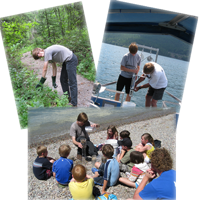
Michael Harrison, Whitman College, Walla Walla, WA
As I read my intern duties before I started work in May, I wondered what I should expect. Limnological field data collection: I had helped the institute once before with lake sampling, the necessarily complex process of filling bottles with lake water from specific depths. Data entry: I imagined typing endless streams of numbers for hours on end. I thought, I can do that. It’s not all that different from what I do for recreation, staring intently, hunched over a computer screen. I would be working for three months, though. Wouldn’t I get tired of it?
I needn’t have worried. Interning with the institute has been the most varied work experience I could imagine. As soon as I settled into the office Executive Director Mike Koopal had me researching zebra mussels and Eurasian watermilfoil so I could take surveys and inform people about aquatic invasive species. I spent many weekend afternoons asking boaters if they had “heard the advice to inspect, clean, drain and dry your boat and equipment” and moreover whether they would support invasive species prevention through a local user-fee (fortunately, I completed the surveys unscathed).
Working with the database required much more problem solving than it did typing. Formatting and graphing data compiled from the DNRC and WLI databases took some creative computing, but I found the work quite rewarding. During the stressful wine auction week, there were literally hundreds of pages to be formatted and printed. There’s nothing like printing on expensive stationery to make me recheck my work. My work responsibilities also extended to equipment maintenance. I spent several days making improvements to the research vessel Mayfly with Environmental Scientist Chris Ruffatto, and often helped prepare our gear for sampling days. I’m happy to report that I didn’t drop any of the pieces of equipment more expensive than my car. I’ve never thought of myself as an educator, but I even muddled through an afternoon at City Beach demonstrating permeability and porosity to the kids attending the Parks and Recreation summer day camp.
My internship provided a perfect range of experiences and invaluable opportunities for growth. Programs like this make me wish students could spend less time in classrooms and more time out working. Most of the time and effort we spend in school doesn’t help anyone but us. A better way to learn is to have a beneficial project motivating us to develop our skills. The large part of the funding for the internship came through the Washington State Work Study Program. My thanks go especially to Mike, Chris, and the Board, but also to any of you Washington state residents who pay for such enlightened and generous educational programs.
Summer Internship 2009
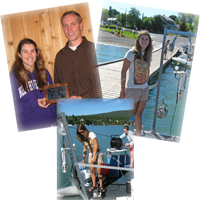
Kristi Whisler, Whitefish High School, Whitefish, MT
That a class on scientific research would turn into an award winning science project and a summer of the scientific study of local lakes surprised Whitefish High School senior Kristi Whisler—science was not something she planned to devote an entire summertime to. Before that class, Whitefish Lake was just a favored swimming area. Whisler’s study on the effects of fire retardant on the zooplankton in Whitefish Lake earned her the Grand Award 4th Runner Up (5th place overall out of 50 competitors) at the Montana State Science Fair. WLI executive director, Mike Koopal served as Kristi’s project advisor. In 2008, Whisler signed on as an unpaid intern at the Whitefish Lake Institute and spent countless hours assisting in the collection of water quality samples. “I’d always loved the lake and wanted to know more about it,” Whisler explained. Whisler’s introduction to the science of water quality started in her freshman year at Whitefish High where she participated in Chris Ruffatto’s Project FREEFLOW program. Her high school science learning culminated with her award at the science fair and as a team member of a Whitefish High team that took third place at the Montana Envirothon. It’s the depth and dedication that Whisler employed following the trail of water science that earned her the year’s stewardship award. Whisler took take her talents to Northwestern the following fall to start her collegiate career.
Summer Internship 2009
